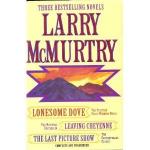|
This section contains 357 words (approx. 2 pages at 300 words per page) |

|
McMurtry's point of view [in Somebody's Darling], in detailing dozens of brightly drawn, often scary characters, ranges from acerbic satire to bitter horror; the weakest section, the middle one, by the producer, is as coarse, shallow, and foul-mouthed as its narrator. McMurtry really tells us nothing new about Hollywood—that the purveyors of fantasies are mostly low-spirited, corrupt, and earthbound—but the novel is engrossing, if never as moving as it is knowingly shocking. (p. 2134)
David Bartholomew, in Library Journal (reprinted from Library Journal, published by R. R. Bowker Company, a Xerox company; copyright © 1978 by Xerox Corporation), October 15, 1978.
[In Somebody's Darling, McMurtry] has perhaps attempted the impossible: he's portraying today's Hollywood, from the inside, in all its glossy ugliness, while at the same time trying to coax from that milieu some tenderness, some equivalent for the dead nostalgia of old-time Holly-wood. And in the first third of this...
|
This section contains 357 words (approx. 2 pages at 300 words per page) |

|


